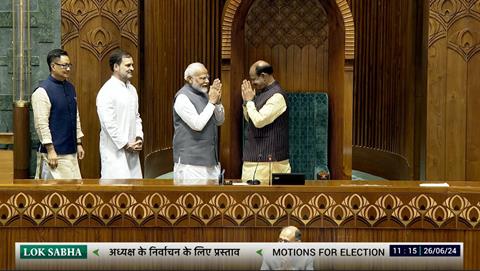Om Birla Re-elected as Lok Sabha Speaker Amidst Rare Electoral Contest
Birla's re-election as Lok Sabha Speaker mirrors historical precedents, joining the ranks of notable multi-term speakers like G.V. Mavalankar and Dr. Balram Jakhar.
In a major political event, Om Birla was re-elected as the Speaker of the Lok Sabha for a second consecutive term through a voice vote, marking a rare occurrence in India’s parliamentary history. This election underscores not only the procedural aspects of India’s parliamentary democracy but also the political dynamics within the Lok Sabha, the lower house of India’s Parliament.
consecutive term through a voice vote, marking a rare occurrence in India’s parliamentary history. This election underscores not only the procedural aspects of India’s parliamentary democracy but also the political dynamics within the Lok Sabha, the lower house of India’s Parliament.
Om Birla’s re-election on June 26, 2024, followed the nomination process in which the National Democratic Alliance (NDA) put forward his candidacy. In contrast, the opposition, spearheaded by the INDIA Alliance, nominated Kodikunnil Suresh, a seasoned Congress MP. This nomination from the opposition set the stage for a potential electoral contest. However, the opposition did not press for a division of votes, leading to Birla’s election by acclamation.
This event is noteworthy as it is only the fifth instance where a Speaker of the Lok Sabha has been elected for more than one term. The practice has historical precedents with figures like G.V. Mavalankar and Dr. Balram Jakhar, who have also served multiple terms, highlighting the exceptional trust and respect they commanded across party lines.
The election of a Speaker in the Lok Sabha is governed by Article 93 of the Indian Constitution. It is detailed further in the Rules of Procedure and Conduct of Business in the Lok Sabha. According to these rules, the election is typically set for the third day of the first session of a new Lok Sabha. For the 18th Lok Sabha, this process began on June 24, 2024, with the election following two days later. The process entails nominating candidates by noon the day before the election, which must be seconded by another member. The Speaker Pro-Tem, who oversees the election, then conducts the vote.
This year’s election was marked by its adherence to these established protocols but was unique in requiring an actual vote rather than a mere consensus, which has been more common in past elections. The occurrence of a vote, rather than a unanimous selection, indicates a shift from the traditional non-contentious appointment of the Speaker and reflects deeper partisan divides within the house.
Historically, the Lok Sabha has seen divisions during the election of the Speaker only three times before — in the 1st, 4th, and 5th Lok Sabhas. These instances were during politically turbulent times, suggesting that such divisions often mirror broader political challenges or transitions.
SPEAKERS OF LOK SABHA
| Sl. No. | Name | Period | |
| From | To | ||
| 1. | Shri G. V. Mavalankar | 15.05.1952 | 27.02.1956 |
| 2. | Sh. M. A. Ayyangar | 08.03.1956 | 10.05.1957 |
| 11.05.1957 | 16.04.1962 | ||
| 3. | Sardar Hukam Singh | 17.04.1962 | 16.03.1967 |
| 4. | Shri N. Sanjiva Reddy | 17.03.1967 | 19.07.1969 |
| 5. | Shri G.S. Dhillon | 08.08.1969 | 17.03.1971 |
| 22.03.1971 | 01.12.1975 | ||
| 6. | Shri Bali Ram Bhagat | 05.01.1976 | 25.03.1977 |
| 7. | Shri N. Sanjiva Reddy | 26.03.1977 | 13.07.1977 |
| 7. | Shri K.S. Hegde | 21.07.1977 | 21.01.1980 |
| 8. | Shri Bal Ram Jakhar | 22.01.1980 | 15.01.1985 |
| 16.01.1985 | 18.12.1989 | ||
| 9. | Shri Rabi Ray | 19.12.1989 | 09.07.1991 |
| 10. | Shri Shivraj V. Patil | 10.07.1991 | 22.05.1996 |
| 11. | Shri P.A. Sangma | 23.05.1996 | 23.03.1998 |
| 12. | Shri G.M.C. Balyogi | 24.03.1998 | 19.10.1999 |
| 22.10.1999 | 03.03.2002 | ||
| 13. | Shri Manohar Joshi | 10.05.2002 | 02.06.2004 |
| 14. | Shri Somnath Chatterjee | 04.06.2004 | 31.05.2009 |
| 15. | Smt. Meira Kumar | 04.06.2009 | 04.06.2014 |
| 16. | Smt. Sumitra Mahajan | 06.06.2014 | 17.06.2019 |
| 17. | Shri Om Birla | 19.06.2019 | Till Date |
Despite the potential for contest, Om Birla’s re-election as Speaker reflects his broad acceptability among most members, underscoring his previous tenure’s effectiveness. His leadership style, parliamentary conduct, and administrative decisions likely played significant roles in securing his re-election without necessitating a divisive vote.
On the other hand, Kodikunnil Suresh, the opposition’s candidate, despite not being elected, remains a significant parliamentary figure as one of the most senior members of the 18th Lok Sabha. His experience and insights continue to be vital for the house’s functioning.
The role of the Speaker is pivotal in the Lok Sabha, responsible not only for maintaining order but also for ensuring that debates and legislative processes are conducted fairly. The Speaker’s impartiality is crucial for the legitimacy of any decisions made within the house. Given the Speaker’s influential role, the election is more than a procedural necessity; it reflects the political will and direction of the ruling government and the opposition.
Om Birla’s re-election as Speaker, while following constitutional and procedural frameworks, also signals a continuity in leadership that may influence the government’s legislative agenda. It also points to a continuity in how parliamentary proceedings are managed, potentially impacting India’s broader legislative and political landscape. As Birla takes on this role again, his actions and decisions will be critical in navigating the complexities of a diverse and often divided house in a pivotal period of India’s democratic journey.
